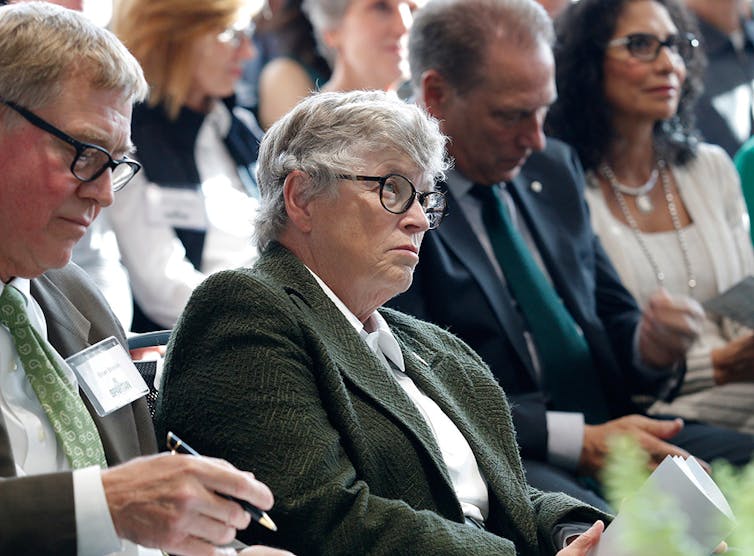What employers can do to stop the next Larry Nassar
Employers like Michigan State play a critical role in protecting people – or not – from abuse by people on their payroll.

The criminal case against Larry Nassar ended on Jan. 24 after the testimony of more than 100 former gymnasts led to what amounts to a lifetime prison sentence for sex crimes.
The legal saga surrounding his decades of abuse, however, is far from over.
Michigan State University, where Nassar worked as a doctor, now faces civil lawsuits from 140 of Nassar’s victims. The scandal prompted the resignation of the school’s president.
USA Gymnastics, which designated Nassar as a team doctor and later chief medical coordinator, is also being sued.
While the courts - and ongoing state and federal investigations – will determine what officials at these organizations knew and whether they are legal responsible, the Nassar scandal presents a broader lesson for other employers.
For years, employers like Michigan State have failed to recognize the critical role they play in protecting people from bad actors on their payroll. Nassar’s decades of sexual assault reveal a trail of missed opportunities, familiar to anyone who followed the child abuse scandal at Penn State.
A recurring theme
In 1998, a psychologist called child welfare on Gerald Sandusky, the then-assistant football coach at Pennsylvania State University.
Her 11-year-old patient had reported that Sandusky hugged him in the shower at the university’s athletic facilities. Even though he admitted to the conduct, the district attorney declined to press charges following investigations. Child protective services took no action, and Penn State officials did nothing.
Sandusky continued to abuse children on and off for a decade. When he was finally arrested in 2011 for child sex abuse, he still had keys to the fitness building.
Nassar’s story followed a similar course. Numerous victims reported that they alerted Michigan State University of his abuse as early as 1997. Authorities generally accepted Nassar’s account that it resulted from a “misunderstanding.”
The university eventually conducted a Title IX investigation in 2014 but sided with Nassar, concluding his conduct was not sexual. Michigan State did not fire Nassar until 2016 after The Indianapolis Star ran a story about the abuse.

Legal distancing
Employers occupy an ambiguous role when it comes to policing the workplace for bad actors, as I discovered in research on cases involving employees accused of child mistreatment. Employers rightly believe that the police and child welfare have more expertise on recognizing criminal and abusive conduct.
Yet law enforcement makes decisions based on a variety of factors unrelated to the veracity of a victim’s allegations. And in those situations, employers often don’t realize that they are the last gatekeeper in a position to protect others from future harm posed by someone on their payroll.
Although the law in this area is complex, it tends not to encourage employers to take a more active role. Broadly speaking, the law does not hold employers automatically liable for criminal or other intentional bad acts of their employees. The law essentially assumes that these employees are rogue actors, and it’s up to the victim to show the employer is responsible.
Plaintiffs must often prove that the employer knew or should have known about the conduct and failed to act or even in some cases that the employer had actual knowledge and was deliberately indifferent to the conduct.
As a legal matter, employers are better off by knowing less. So they tend never do enough with the limited information they have. They can fail to educate employees on the importance of reporting internally and to law enforcement. They can miss the significance of repeated complaints. They might believe the victim on the facts but accept the abuser’s interpretation.
When you’re unprepared for the unthinkable, it’s never an emergency.
Psychological shortcuts affect victims – and employers
Like Sandusky before him, Nassar exploited psychological shortcuts that impair our ability to detect misconduct and respond to emergencies.
In a famous experiment, social psychologist Stanley Milgram showed how easily people submit to the authority of someone wearing a white coat. In the experiment, Milgram persuaded many subjects to deliver what they believed to be nearly fatal electric shocks to someone in another room. Nassar exploited this weakness in the face of authority by cloaking his abuse as medical treatment in a recognized medical facility.
People are also vulnerable to second-guessing themselves and deferring to the action – and inaction – of others. In the words of social psychologist Robert Cialdini observed, we “view a behavior as correct in a given situation to the degree to which we see others performing it.” If a room fills with smoke, but everyone else stays sitting there, we’re less likely to leave the room.
Every institutional affiliation, license and title made it easier for Nassar to hide “in plain view” – and even abuse patients with a parent in the room. As gymnast Rachael Denhollander explained:
“And I was very confused, trying to reconcile what was happening with the person he was supposed to be. He’s this famous doctor. He’s trusted by my friends. He’s trusted by these other gymnasts. How could he reach this position in the medical profession, how could he reach this kind of prominence and stature if this is who he is?”
These psychological tendencies affected victims, but they probably also influenced the officials whose very job it was to protect the victims. Employers forget who holds the keys and defer to the power and authority they – and they alone – granted the accused.
Ultimately, lawmakers can promote better practices by eliminating the “knowledge” element in negligent retention and Title IX claims. Courts should focus instead on whether the employer exercised care through its prevention, investigation and response measures. Otherwise, not knowing becomes a way out.
If we recognized how difficult it is for survivors to tell their story, every piece of information they provide would be treated with diligence and care. And every voice would be given equal weight.
Elizabeth C. Tippett does not work for, consult, own shares in or receive funding from any company or organization that would benefit from this article, and has disclosed no relevant affiliations beyond their academic appointment.
Read These Next
GLP-1 drugs may fight addiction across every major substance, according to a study of 600,000 people
GLP-1 drugs are the first medication to show promise for treating addiction to a wide range of substances.
Far from random, China’s global port network is clustering near the world’s riskiest trade routes
A review of 133 countries’ ports found a correlation between investment from China and proximity to…
Front lines of humor: Dark humor voices Ukrainians’ hopes for victory
Humor has served many functions since Russia’s full-scale invasion, from providing Ukrainians with…






